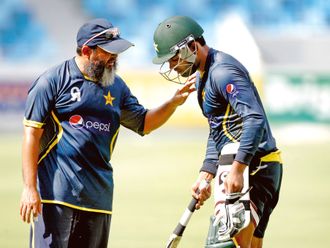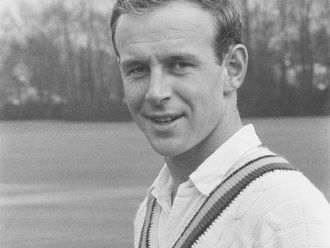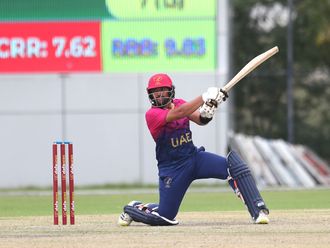London: Sledging is usually treated as a big joke — an irrelevance, indeed — by professional cricketers. Yet for all their insouciance, verbal abuse can be a profitable tactic. Just look at the 1993 Ashes. Photos from that summer show Merv Hughes constantly stooping his 6ft 4in frame to bellow imprecations at Graeme Hick through his absurd moustache. There was no subtlety or wit here, just what Steve Waugh used to call “mental disintegration”. Hughes removed Hick in three of his first four innings. Ancient history, perhaps. But you have to chuckle at the turn of events that has now brought Hick’s career full circle. Having spent the past two years working at Brisbane’s Centre of Excellence, he was promoted on Thursday to the post of Australia’s batting coach. Thankfully Hughes is no longer in his own former role as a national selector, otherwise this unlikely pair would have been forced to put their heads together again. There are echoes here of Harold Larwood, the human battering ram who enforced the Bodyline policy of 1932-33.
If the Aussies baited Hick, they hated Larwood. And yet he wound up spending more than half his life in Sydney, after one of his old foes — opening batsman Jack Fingleton — helped find him a job at a soft drinks firm. Or look at Tony Greig, another southern African who was assimilated into — and then jettisoned from — the England team. Disillusioned by the fallout from World Series Cricket, Greig made a new life as a Channel 9 commentator. When you grow up on the veld, Australia’s informality — and the sheer sense of space — must have a powerful appeal. Hick’s story began on a Zimbabwean tobacco farm, and continued at Worcestershire, the county where he scored the bulk of his 41,112 first-class runs. But playing for England failed to generate any sense of belonging. Not that he was alone there. In the bad old 1990s — a period when Ted Dexter turned selectorial dithering into an art form — almost everyone in the team would have declared their first loyalty to Essex or Lancashire rather than England. This was a toxic culture.
The two players who suffered most were the two with the greatest natural ability. Mark Ramprakash should have been another Denis Compton, but never found a steady batting position throughout 52 underwhelming Test appearances. And then there was Hick, the eternal wallflower. When England held a victory booze-up at Melbourne in 1998, he spent much of the night hiding behind a pillar.
Admittedly, this was not an easy time to be an international batsman. If Hick inflicted death by a thousand cuts to visiting bowlers at New Road, then he experienced his own agonies at the hands of numerous legendary Test performers: Shane Warne, Curtly Ambrose, Muttiah Muralitharan and Wasim Akram. The challenge was all the greater because, in the words of team-mate Robin Smith: “They all wanted to get out the next Don Bradman. When I was batting with [Hick] and standing at the non-striker’s end, I thought I was playing in a different game.”
Two decades on, it makes perfect sense that Hick and Ramprakash — who became England’s batting coach in 2014 — will soon be reunited on opposite sides of an Ashes series. To be a coach is to be a sporting exorcist, working to banish other men’s demons. Having spent so many years battling their own inner voices, this delicate duo are perfectly qualified for the job.












